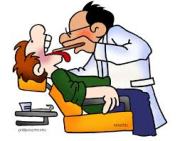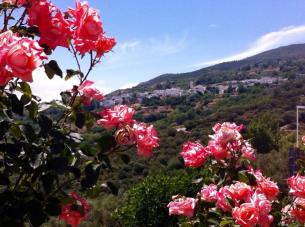Dentists don’t often make me laugh. Sadly, it’s years since they were allowed to use laughing gas to knock us out before an extraction. And I’m a really rubbish patient. But my Spanish dentist is lovely. Film-star looks, craggy, sexy voice, about the right age ….. COUGH! Sorry, I wandered off for a moment there! Anyway, back on topic, he DID make me laugh.
We’d talked through in detail what he was going to do. I had a previously-filled tooth which had broken, and most of the filling had fallen out too. He was going to dig the rest out (see why I don’t like dentists?), refill it, then prepare it for a crown (corona in Spanish). After going over the process again, the chair went back and l relaxed (though not a lot). He has a nice bedside manner, and chatted about all sorts of things. Well, more accurately, he chatted and I dribbled. He thought my Spanish had improved even in the last couple of months. I always feel better when people compliment my Spanish. He probably says it to all his extranjero patients as it’s cheaper than anaesthetic!
why I don’t like dentists?), refill it, then prepare it for a crown (corona in Spanish). After going over the process again, the chair went back and l relaxed (though not a lot). He has a nice bedside manner, and chatted about all sorts of things. Well, more accurately, he chatted and I dribbled. He thought my Spanish had improved even in the last couple of months. I always feel better when people compliment my Spanish. He probably says it to all his extranjero patients as it’s cheaper than anaesthetic!
Then suddenly he started telling me what a difficult language it is. What a big problem the language is. Despite the heap of assorted fingers and metal instruments in my mouth, I managed to disagree. He insisted, repeating it was the most difficult language he had ever fought against. I dribbled, disagreeing. And disagreed, dribbling.
“Why can’t we get this language under control?” he said, in exasperation. Suddenly it dawned on me. Just as in English, “language” and “tongue” are the same word! He was annoyed with my uncontrollable tongue, along with all the dentists I have ever encountered. It will never stay neatly to one side, it wanders over to get in the way, and pushes random drills and instruments out of my mouth.
“¡Ésta lengua es la peor que he encontrado en toda mi vida!” he sighed. “This tongue is the worst I have come across in my whole life!” He added quickly “Not the patient, just the tongue”, and got the nurse to put a dental dam in – a tarpaulin-sized sheet of rubber to trap my tongue where he wanted it, out of the area of activity. Finally it behaved, for long enough for him to finish the filling. “¡Y ya esta!” – he sighed in relief. I don’t THINK it was because he couldn’t face my roving uncontrollable tongue back in his consulting room, but he gave me the good news that he felt he had done a good enough job filling the tooth, that we didn’t need to go ahead with the more expensive crown. It’s very rare for me to be amused by anything involving dentists, but that confusion over “lengua”and “lengua” did raise a chuckle.
tongue”, and got the nurse to put a dental dam in – a tarpaulin-sized sheet of rubber to trap my tongue where he wanted it, out of the area of activity. Finally it behaved, for long enough for him to finish the filling. “¡Y ya esta!” – he sighed in relief. I don’t THINK it was because he couldn’t face my roving uncontrollable tongue back in his consulting room, but he gave me the good news that he felt he had done a good enough job filling the tooth, that we didn’t need to go ahead with the more expensive crown. It’s very rare for me to be amused by anything involving dentists, but that confusion over “lengua”and “lengua” did raise a chuckle.
The weekend before had involved another “interchange of tongues” – this time purely in the linguistic sense! A group of 20 went walking in the Alpujarras mountains, a wonderful combination of fresh air, superb high-level walks, excellent company, and more steps forward in colloquial Spanish. The Spanish half of the group delighted in teaching us slightly rude phrases – we had a hysterical hour walking between two gorgeous Alpujarran pueblos, discussing the different levels of asking to be left alone on a beach or in a bar – going right up to some really quite rude options, both in Spanish and in English! And some of my Spanish friends continued the tradition of high-fiving me on every successful subjunctive.
forward in colloquial Spanish. The Spanish half of the group delighted in teaching us slightly rude phrases – we had a hysterical hour walking between two gorgeous Alpujarran pueblos, discussing the different levels of asking to be left alone on a beach or in a bar – going right up to some really quite rude options, both in Spanish and in English! And some of my Spanish friends continued the tradition of high-fiving me on every successful subjunctive.
The oddest part of the weekend was how local people we encountered en route couldn’t work out our group. Some of us would clatter into the bar first, and start ordering cold drinks. As the rest trickled in behind us, the barman and the other customers would turn to stare at us. “¿Eres español?” Well clearly not. Oddly, the Catalan man was asked the same question! Jean confused everyone too – he is American with a clear US accent, but of Spanish parents so speaks fluently. Customers tapped gently on my shoulder, asking what our group was. Well, a mixture of a group of friends, British, Spanish, a smattering of other nationalities, coming together once a month to practise languages but mostly just to hang out, explore new corners of Andalucía, and this time to spend a weekend walking. The frequency and intensity of the interest surprised me. Surely a multi-national group of friends isn’t so strange?
to stare at us. “¿Eres español?” Well clearly not. Oddly, the Catalan man was asked the same question! Jean confused everyone too – he is American with a clear US accent, but of Spanish parents so speaks fluently. Customers tapped gently on my shoulder, asking what our group was. Well, a mixture of a group of friends, British, Spanish, a smattering of other nationalities, coming together once a month to practise languages but mostly just to hang out, explore new corners of Andalucía, and this time to spend a weekend walking. The frequency and intensity of the interest surprised me. Surely a multi-national group of friends isn’t so strange?
Sunday afternoon and we limped back into Capileira after a second high mountain walk. Most hugged and kissed their farewells and rushed off, but Martxe and Joan (pronounced as Joanne, but in Catalunya it is a man’s name) and I had been getting into a deep political conversation about neo-capitalism, new systems of co-existence, communes, communities and communitarianism, and animal rights and environmental policies in Spain, and we didn’t want to stop. Several drinks and two hours later, replete with tapas and content with our shared world vision, Martxe walked down to her village cave house, and Joan and I returned to our cars and began the winding drive back down to the highway. If the weekend were to have been a subjunctive, it would have merited a high-five.
as Joanne, but in Catalunya it is a man’s name) and I had been getting into a deep political conversation about neo-capitalism, new systems of co-existence, communes, communities and communitarianism, and animal rights and environmental policies in Spain, and we didn’t want to stop. Several drinks and two hours later, replete with tapas and content with our shared world vision, Martxe walked down to her village cave house, and Joan and I returned to our cars and began the winding drive back down to the highway. If the weekend were to have been a subjunctive, it would have merited a high-five.
© Tamara Essex 2015 http://www.twocampos.com
THIS WEEK’S LANGUAGE POINT:
That was a useful weekend, good immersion in Spanish, some subjunctive practice and a few high-fives. Back in the city on the Monday morning at the dentist, I discovered how useful this kind of intensive practice really is.
I arrived early, but waited endlessly in the dentist’s waiting room. 45 minutes later than my appointment, I sought out the receptionist and asked if there was a problem. “No, all is fine” she said. “But the dentist had to deal with an emergency first.” “Ah, vale. Pero si me lo hubieras dicho más pronto, lo habría entendido antes, sin preocuparme tanto” I said. Without pausing, without thinking, and without stumbling. Only afterwards, lying on the dentist’s chair, did I realise that it was not at all a bad sentence for a student! “OK, but if you had told me sooner, I would have understood, without worrying so much.” 
I mentally high-fived, none of my friends being there to do it. ¡Choca los cinco! Then I went back to dribbling.